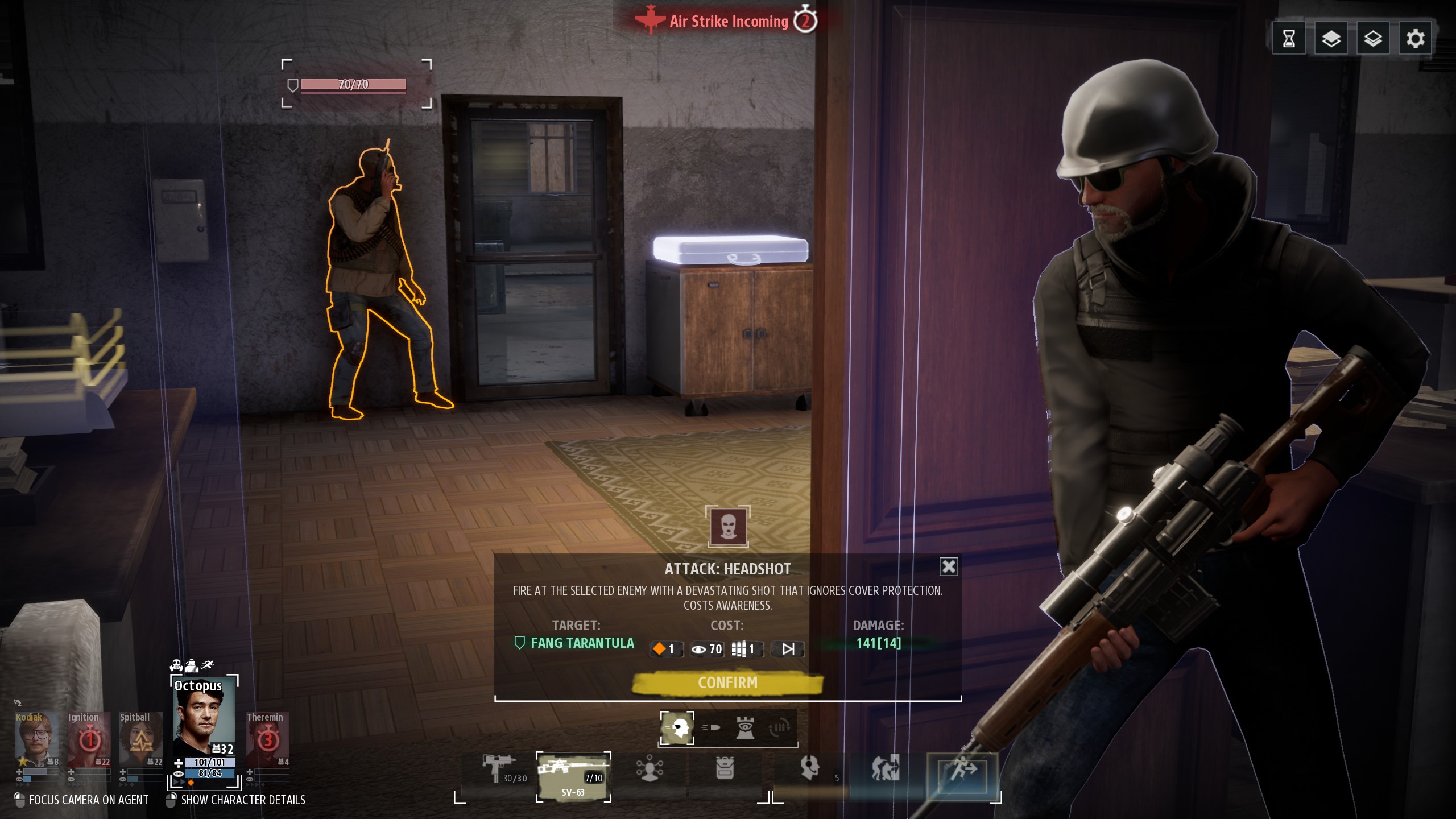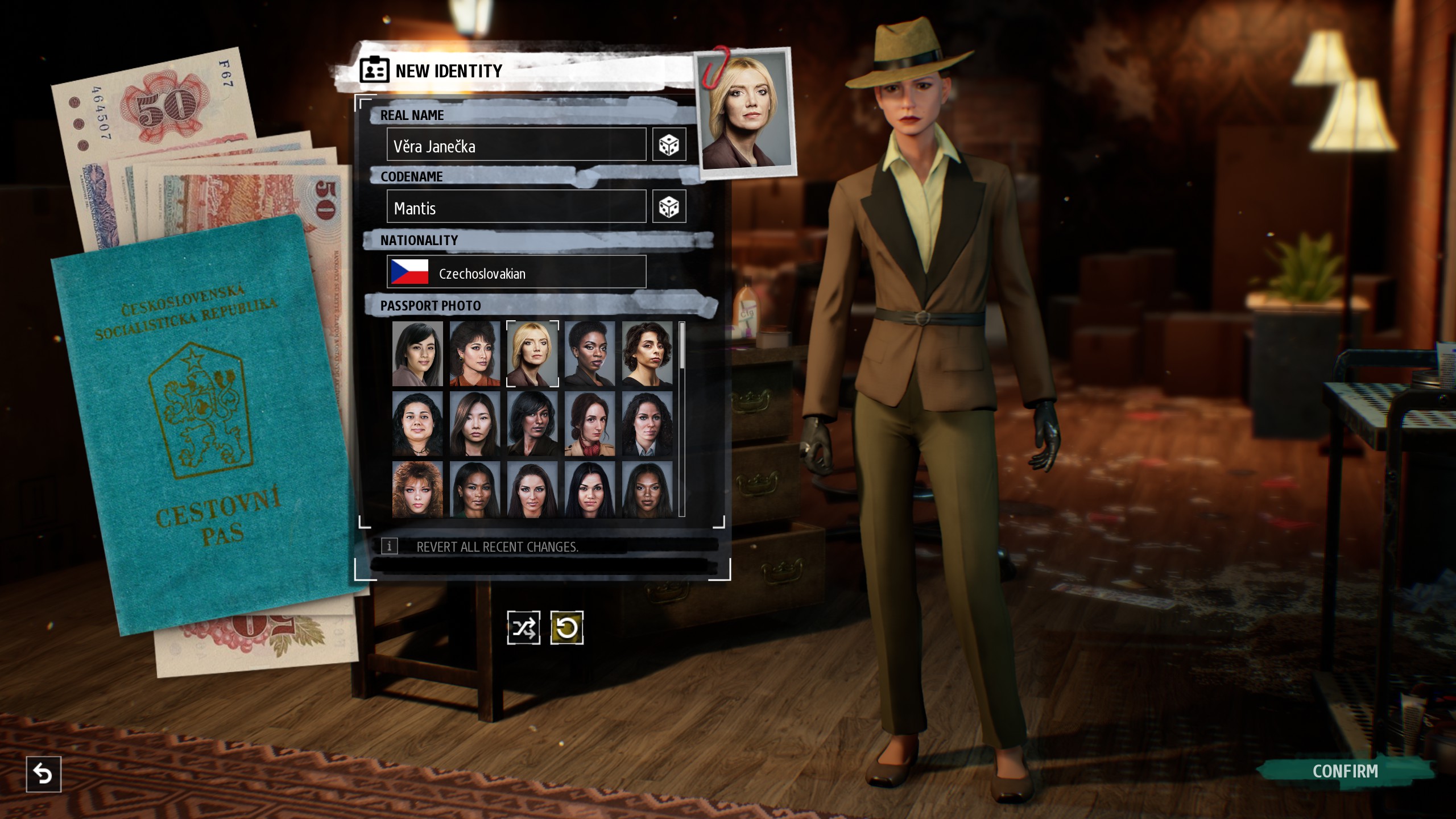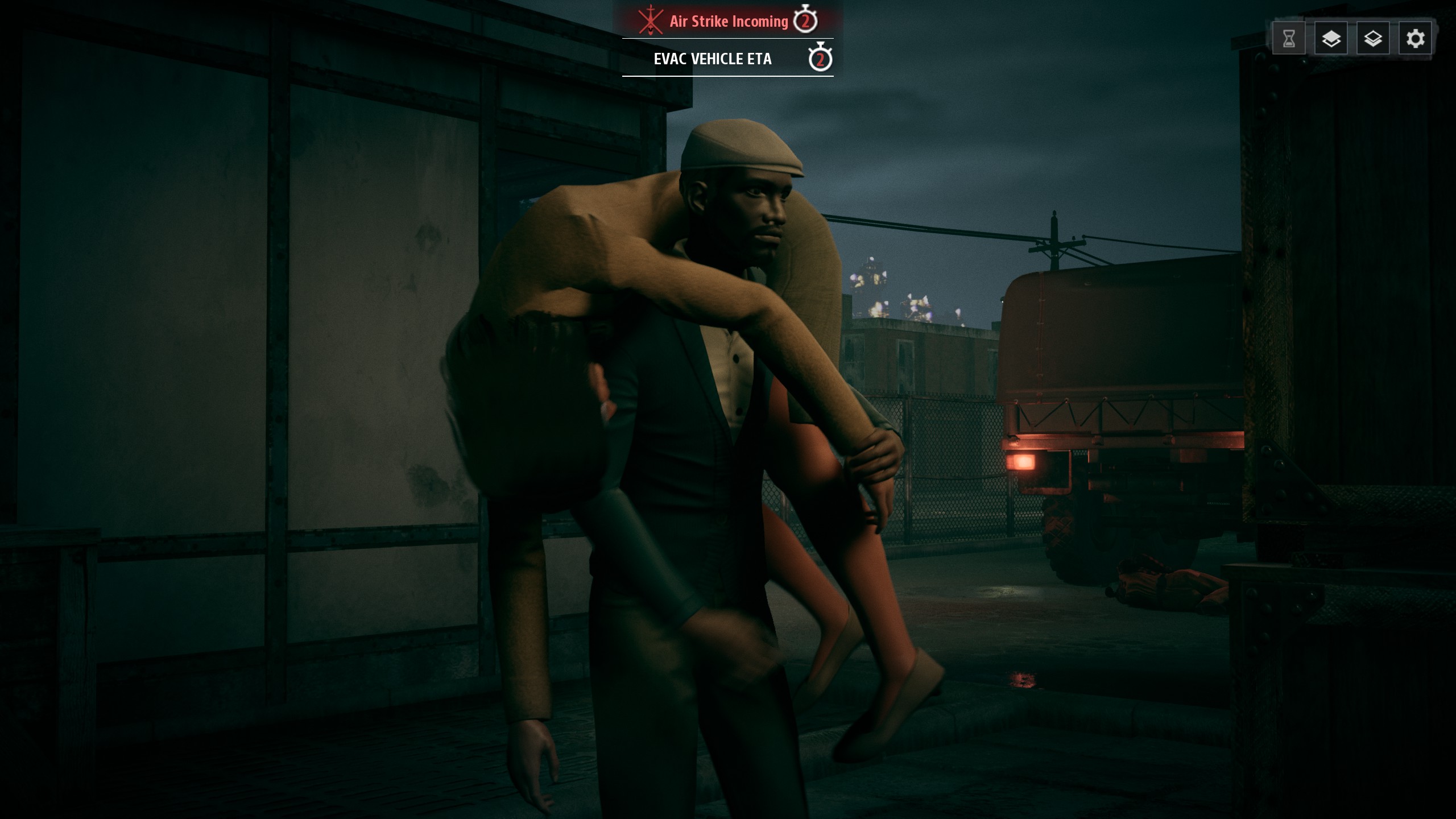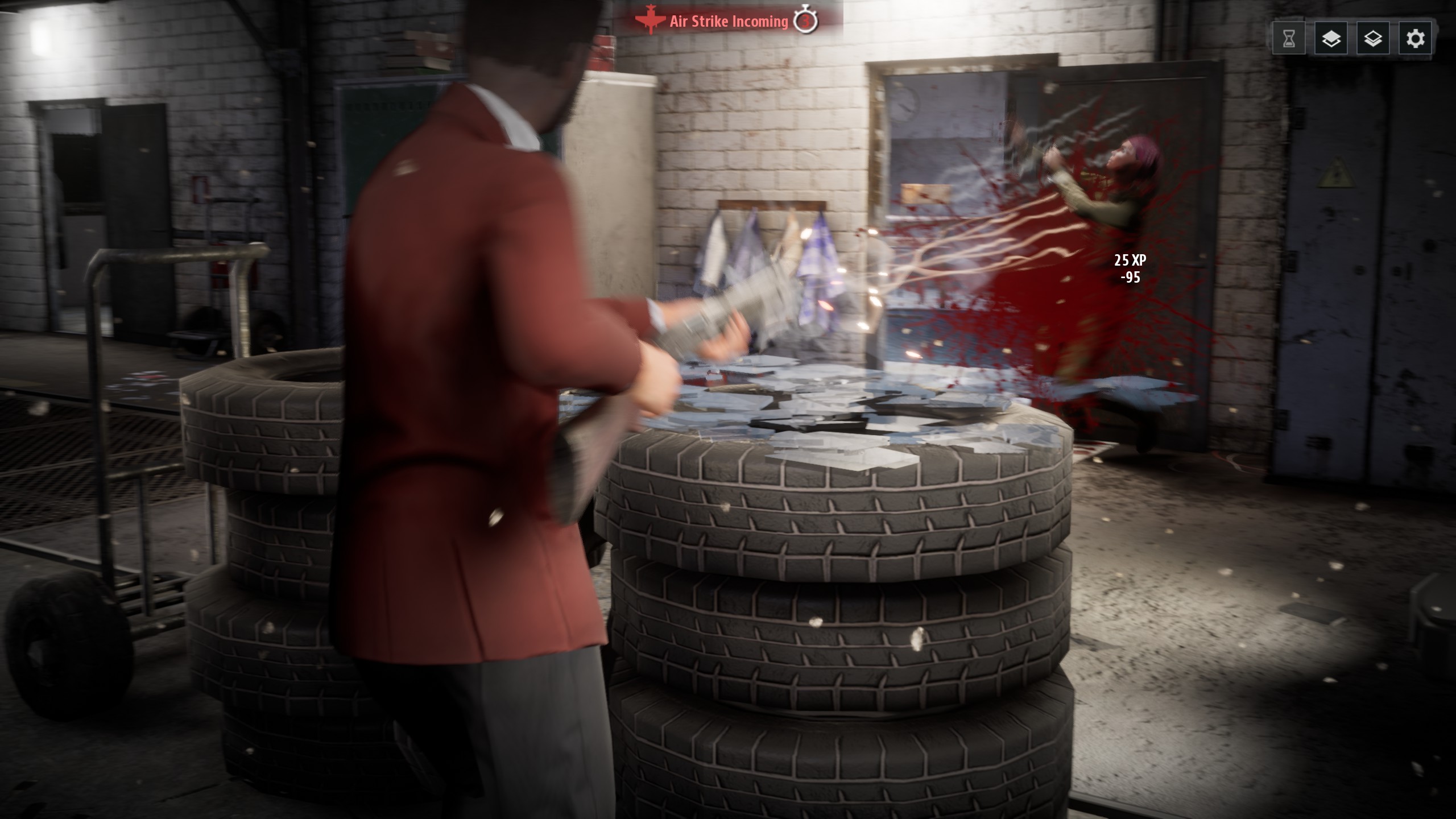Our Verdict
A promising setting and clever systems are let down by simple enemies, simpler characters, and strange balancing.
PC Gamer's got your back
What is it? A turn-based strategy game set in the Cold War where stealth and head-on assault are viable strategies.
Expect to pay: $40 / £30
Developer: CreativeForge
Publisher: Good Shepherd Entertainment
Reviewed on: Windows 10, Core i7-4770K, 16GB RAM, GeForce GTX 980 Ti
Multiplayer: Online, two players
Link: Steam
Phantom Doctrine grabbed my attention the moment it made me brainwash one of my own spies.
It all went wrong in Kiev. A security camera spotted one of my disguised agents snooping on a computer terminal. The base went on alarm. Soviet guards nearly killed my whole team, but with a little help from a smoke grenade, I was able to get almost everyone to the extraction point. Agent Wildfire didn't make it. Left bleeding out in an alley, she's captured by the enemy. One of my best, gone.
Or not. Four days later, Wildfire shows up at the doorstep of my secret base. She's banged up but ready to resume work. The problem is I have to assume that she was turned by the enemy, made a mole in the time she was away. The only way I can be sure is to wipe her brain. I have a base facility just for this purpose, a room dedicated to interrogation and mind control of friend and foe.
Double-crossed
Phantom Doctrine is a stranger XCOM with rougher edges. The combat doesn't compare favorably to Firaxis' cinematic chess game, and it does little to explain core systems that differentiate it, like stealth and detection. As you approach the end of its 40-hour campaign, each infiltration mission begins to feel like the last. It reminds me a lot of Jagged Alliance—occasionally brilliant moments emerge from unpredictable systems and opaque rules, but more often I just felt bored.
At the beginning of a campaign you decide if your main character is ex-CIA or ex-KGB, and this choice of background sets up a distinct intro to the bad guys, a conspiracy group called The Beholder Initiative. When you're not playing the turn-based portion of Phantom Doctrine, you're engaged in a pausable global boardgame against this shadowy opponent, moving your agents between cities like pawns, playing whack-an-actual-mole as Beholder agents try to locate your base or deny you access to NPC informants. There's a ping in Havana—should you send just one agent to check it out, or divert a whole team? This metagame portion of Phantom Doctrine becomes a slight mess of alerts and micromanaging by the end of the campaign, but it adds good urgency along the way.
A more pleasant non-combat task is the conspiracy board. Your cabal uncovers piles of documents during missions or as a passive task inside your hideout, and this intel takes the form of an honest-to-goodness fullscreen corkboard where you have to click-drag lines of yarn between documents. It's a word matching mini-game, but a strangely captivating one. The gesture of moving papers around made me feel like a crazed Charlie Day as codenames swirled around in my head, and it's a nice payoff when you crack a dossier to push the plot forward.
When Phantom Doctrine leans into its theme like this, it reminds you of how much interesting unexplored territory there is in the spy genre. It's unfortunate that such a core component—the spies themselves—are underdeveloped.
Keep up to date with the most important stories and the best deals, as picked by the PC Gamer team.
Things can certainly go belly-up when four or five extra enemies appear, especially if one of your agents has already been incapacitated.
In and out of combat, it's an identity crisis for your spies. Because agents all pick from the same perks and weapon training and can carry any weapon, I struggled to build fun specialists like ace snipers or close-range assassins. I would've loved to see something like a skill tree that let you spec agents down separate careers. It also hurts that the agent hiring menu continually serves up high-level, powerful spies, offering instant upgrades over the characters I'd invested hours into.
A couple of odd design decisions make it even harder to create unique agents. Melee takedowns are powerful in Phantom Doctrine: any agent can execute an instant one-hit-kill as long as they have more HP than their target. Perks that increased HP or damage resistance became no-brainers, and I was presented with few tough choices when leveling up.
Pair this with the "Actor" perk, and a disguised agent (you usually get one disguise per mission) is effectively invisible to all enemies. It felt like having a cheat code—no mission has a time limit, so I could usually comb the map for loot at my own pace, judo-chopping the most troublesome enemies and hiding their bodies at the expense of tension and uncertainty. Erratic spawn locations occasionally made this even easier: on one story mission my undercover agent spawned one move away from the main objective.
A related issue is mission variety. For the first dozen or so hours I felt like I was being presented with a spectrum of tough encounters: rescuing a captive informant, killing or capturing an enemy agent, assaulting an enemy base, breaking in to recover intel. I like the way that ambush missions, like the XCOM 2 scenarios by the same name, pulled the rug out from under me, asking me to escape a warehouse or other facility without my best agents, without my best gear equipped, and totally outnumbered.
Over time, however, the threats Phantom Doctrine throws at you feel one-dimensional. After an alarm is triggered, a squad of heavily-armed reinforcements drop into the map, often hidden from view. Things can certainly go belly-up when four or five extra enemies appear, especially if one of your agents has already been incapacitated. But maybe half the time that these reinforcements threatened me, I was able to throw a single frag grenade that annihilated all of them.
If that didn't work, I could thin them out safely with the off-screen support Phantom Doctrine hands you. As long as you perform a pre-mission surveillance job on the world map, you can bring aid like silenced snipers or gas grenade lobbers that are called in like Call of Duty killstreaks. I wish there was a more interesting consequence to using these deadly tools. Although you're penalized for not making it to your extract quickly enough, those penalties are pretty easily erased post-mission by just spending money, Phantom Doctrine's only major resource, to relocate your base or forging new passports for agents who've accrued too much heat.
Spies like us
It sucks that so many of Phantom Doctrine's good ideas are underdeveloped.
Although it's a bit sparse, the story wrapped around these combat encounters kept my interest. CreativeForge elegantly weaves a fictional conspiracy into Cold War history, and the plot avoids getting bogged down in convoluted geopolitics or diverging completely from reality. It's pleasantly gritty.
However, my favorite story moments are the branching micro-choices Phantom Doctrine sprinkles throughout its campaign, text vignettes that randomly target members of your team. When I got a notification that Agent Wraith might not have been completely honest about his ties to the NSA, I had to choose whether to spend money verifying the truth, confront him, or execute him. Another time, I got a tip from an alcoholic ex-husband claiming that one of my spies was a double agent—do I believe them, or do I interrogate the spouse? And in another case, I had to decide whether to let an agent rejoin her heist crew for one last job.
These are delightful twists. If only Phantom Doctrine would've doubled-down on these moments of flavor, made them more frequent, or more permanent in their effect, my agents might have felt like genuine characters with histories, not collections of stats behind a portrait.
The same is true of the twists that can activate during combat, which desperately need an exciting layer of presentation around them. One of the biggest payoffs in the game should be 'activating' an enemy who you've captured, brainwashed, and then—dramatic reveal—converted to your side mid-mission. But there's no fanfare, dialogue, or musical stinger to accompany this moment. You simply gain instant control of the enemy, the game's code coldly transferring ownership as if it were an ordinary moment.
It sucks that so many of Phantom Doctrine's good ideas are underdeveloped. Completing missions undetected made me feel clever, but melee takedowns are a skeleton key for combat. The random events that target your agents present fun choices but are ultimately fleeting. Interrogating and mind-controlling enemies seems dark and interesting, but mostly amounts to buttons and icons on menus.
Phantom Doctrine is a mediocre strategy game, but it manages to make a convincing case that we need more spy games that lean into the mechanics and meaning of espionage.
A promising setting and clever systems are let down by simple enemies, simpler characters, and strange balancing.

Evan's a hardcore FPS enthusiast who joined PC Gamer way back in 2008. After an era spent publishing reviews, news, and cover features, he now oversees editorial operations for PC Gamer worldwide, including setting policy, training, and editing stories written by the wider team. His most-played FPSes are Hunt: Showdown, Team Fortress 2, Team Fortress Classic, Rainbow Six Siege, and Counter-Strike. His first multiplayer FPS was Quake 2, played on serial LAN in his uncle's basement, the ideal conditions for instilling a lifelong fondness for fragging.






